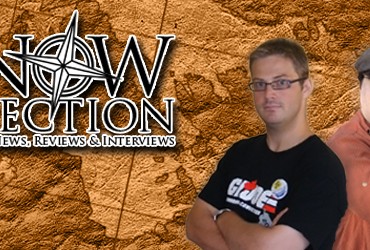In May Paizo revealed their next game setting and system – Starfinder. While Starfinder should be mostly compatible with Pathfinder, there will be places where that will simply not be a reasonable expectation. Not only that, if you haven’t listened to the recordings of the Paizo Banquet or the subsequent panel with James Sutter, Rob McCreary, and Owen KC Stephens, you should.

Scotty (James Doohan) and Picard (Patrick Stewart) in episode Relics, ST: NG (Paramount Pictures, 1994).
In brief, the setting of Starfinder is in the distant but indeterminate future. At some point the planet Golarion has gone missing and all memory of every creature across the multiverse has been altered in regards to that roughly 300 year time period. So, even if your PCs have the ability to summon demons, devils, gods, whatever, even they do not know what happened. In Golarion’s place is Absalom Station and all indications point to something akin to Babylon 5 or ST: Deep Space 9. Space ship travel will be the norm and base classes will have some kind of ship function built in or some other class mechanic that supports ship team work, no hard rules were presented.
In light of that, I know some of you are really excited and have been hoping for a new Pathfinder sandbox to play in and are not willing to wait. I’m wondering why you have been waiting at all? As players and GMs, you have the power to play in whatever setting or in any time period you desire. Today – okay, not really, Andrew started talking about system kitbashing back on Tuesday this week on his Burst of Insight blog – we’re going to start talking about system kitbashing and focus on how a GM can get her party to space. I have no special insights or information on Starfinder and anything presented here is strictly ideas for home-brewing a game. In addition to kitbashing your game, there are many Paizo and 3PP products available on the subjects called out in this blog or references you might want to check out.
What is kitbashing?
Kitbashing is a term that originates with model building. In an effort to make more interesting models, whether cars, trains, or miniatures, the model maker takes parts from one piece/kit and “bashes” them together with pieces from other kits to get the desired otherwise unavailable finished product. Kitbashing isn’t just for models or minis, you can do it to gaming systems too. Kitbashing a system is most useful when you have players who really like a system, but want to play in a different setting.
Which system to use
Before we get started, if this is your first time kitbashing a setting and system, try a short adventure and see how things work before taking the plunge into an extended campaign.
The best part about this type of gaming is you can use any system you like, however some systems are more adaptable than others. The Cypher System, FATE, GURPS, Savage Worlds, and White Wolf’s Storyteller System are setting neutral systems that readily lend themselves to gaming in any genre, any era, your imagination is the limit.
“But, what if my players or I don’t know any of those great systems?”, “My players only like Pathfinder/3.5, but they want to play space opera, what do I do?”, or “Those systems are great, but we really can’t afford more books, how can we still get to space?!” You ask. Well that’s when you get even more creative and clever. We will use Pathfinder as the example system for this discussion.
Getting started
For Pathfinder kitbashing I strongly recommend sticking to CRB. Someone is always going to have their favorite whatever from this other book over here, but the farther you get from the basics, the more challenging it becomes to kitbash if you haven’t done it before. Unless there is a good reason to have something in your game, like the gunslinger – there was a great big cheesy movie many years ago entitled “Westworld” and you can’t have that setting without androids and gunslingers. Be judicious in your choices, a single element might be what makes the setting and you definitely want to include it, but refrain from bring everything and the kitchen sink, you’re game could get muddy.
Take a look at the system and decide what kind of space adventure you’re looking to run. Is your game going to be high tech/low magic, are you going to allow rare mystic magic like The Force, will there be gods and what will their level of involvement be? If there is no magic, all skills, class features, feats, spells, everything related to magic can be chucked from your game. Whew!
Not so fast, you are going to have to account for how your players are going to do the things they usually did through magical means. Fortunately for us, we already have some insight into how to recover this area of game mechanic
“Any sufficiently advanced technology is indistinguishable from magic.” Arthur C. Clarke
Technology can and should be more advanced if you’re playing in space, it isn’t important how that technology got there or what happened in the interim hundreds of years that lead to its creation. Sure we’d all like to know how the Millennium Falcon made the Kessel Run in less than 12 parsecs, but the story really doesn’t hinge on that information. Decide what kinds of things your setting cannot do without, perhaps healing and buffing spells turn into chemical/medicinal supplements, otherwise look to technological devices to provide the support you’re looking for. Make it easy though, remove setting specific descriptions and price them accordingly, no need to break economics here. Minor healing stim = cure light wounds potion with either a set healing amount (I recommend 5) or still use the 1d8+1, since this won’t be cast, go with the lowest “caster level”.
More on magic
Apply the same thinking to magical devices that are now mechanical devices. There are a lot of magic items out there that allow you to fly or “cloaking devices”. Tinker around with the in game expression, without over thinking it, a cloak of elven kind is now a light refracting nanotech cloak that provides the same benefits or becomes an alternate hat of disguise. Players and GM might want to build some setting specific technology items, and is covered in the PCS: Technology Guide. Be aware though that the costs may be disproportionately high because the TG is written with pre-tech Golarion as a reference. Use your best judgement and remember 30 years ago the first cellphones came out, they cost $4,000. Even adjusted for inflation, we do not pay a comparable amount for cellphones. If something feels too expensive, lower the cost. If something feels too available, there was a shortage in manufacturing and now the price has increased, supply and demand will always be a problem in any timeline.
Going back to caster levels, what about those caster classes? Consider converting to technological adepts. Adjusting skills like “use magic device” and all those magic specific knowledge skills, to broaden their scope to magic-like technologies or computer/tech interface skills.
For divine casters, channeling could still work in space, the logistics of how and why are going to be up to the individual GM at this point. Does your setting have gods or is divine magic tied to the PC’s philosophical beliefs and draws on their personal force of will? There are several resources available on this subject. Add in arcane spell casters could hint to Jedi-like powers, consider truncated spell lists that are more thematic, possibly (and very, VERY carefully) running without consideration of arcane vs divine, but pulling the spells that best capture your setting’s feel. At this point extreme caution should be used, since there are reasons clerics don’t have fireball and wizards can’t cure light wounds. While some of those reasons are artifacts from previous editions, maintaining game balance and making magic specific changes can be tricky and definitely a good reason to only run a short test run before committing your group to a setting that might end with you pulling your hair out because the spell casters are nuking all your plotlines from orbit.
Future articles
This edition of Inspire Confidence went really fast and we haven’t even gotten past “What kind of sci-fi space setting are you considering and will there be magic?” We still have space ships, weapons, classes, and who knows what else to cover. Not only do I promise to keep talking about this subject, this is something we use at Marlowe House from time to time, so Andrew will also be talking about system kitbashing on the Burst of Insight blog. With that said, we could use your assistance prioritizing. If you have any questions or you want to see something specifically called out sooner rather than later, please email us at KnowDirection@hotmail.com. I am planning my next column to be a Q&A on handling a difficult gamer situation, so now’s your chance to get a quick turn around on any of your questions.








